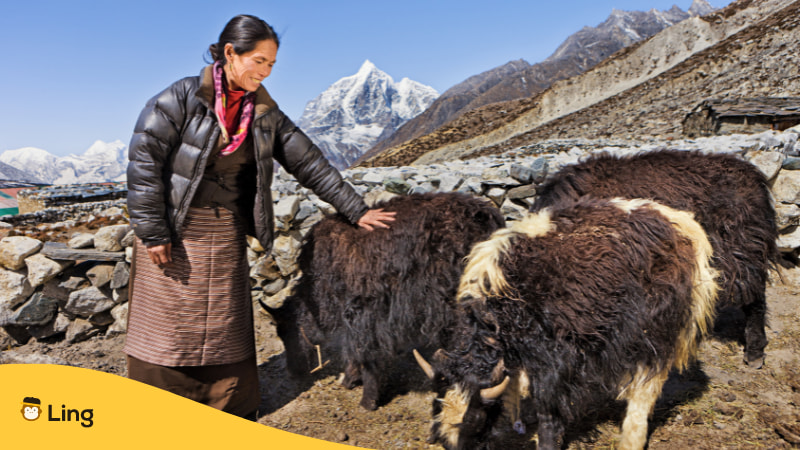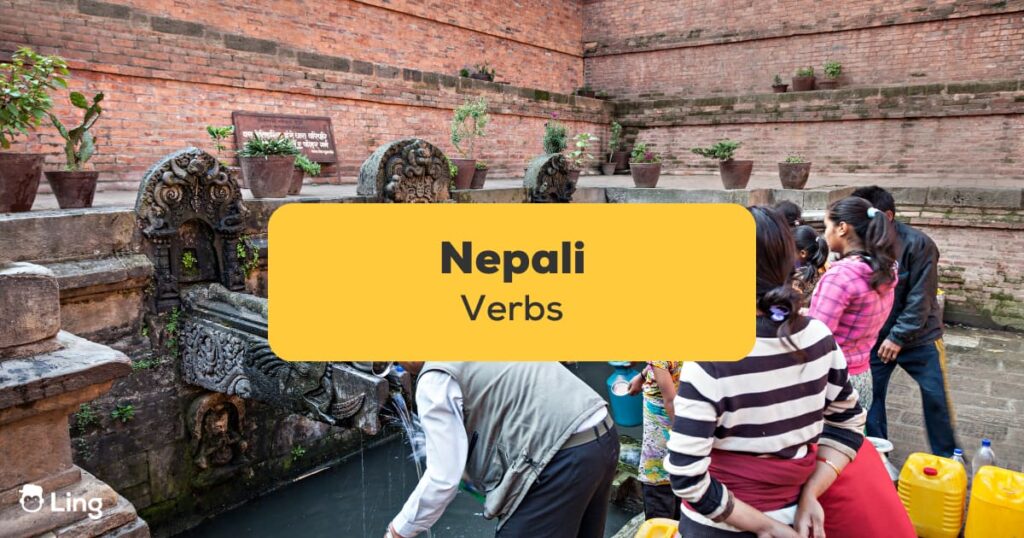Do you want to learn how to conjugate Nepali verbs? Then, you have come to the right place! Scroll down and see the complete Nepali short lessons with valuable examples.
Nepali belongs to the Indo-Aryan language family. Therefore, learning the Nepali language would be a great way to make the most out of the trip if you plan to travel there. Hence, one of the leading language learning apps, Ling App, is here to help you learn the Nepali culture and the Nepali language.
Learning Nepali verbs (नेपाली क्रिया – Nēpālī kriyā) with grammatically correct phrases is very important because its structure is used in daily conversation. So, the more you try to master it, the closer you get to mastering the Nepali language. But first, we need to know the role of verbs in the grammar structure of the Nepali language.
Nepali Verbs And Verb Conjugation
Nepali verbs are those words that convey the action (run, read, walk, bring) or state of being (stay, exist). In most languages, the verb can agree with the person, gender, and/or arguments, including the subject or object.
What Is First Person, Second Person, And Third Person?
The first person, second person, and third person are the forms of expressing points of view.
- First person: “I or we” perspective.
- Second person: “you” perspective.
- Third person: “he, she, it, and they” perspective.
Here are some Nepali verbs examples according to different forms (past, present, and future tense):
| Verbs | Nepali Verbs | Pronunciation |
| To drive | हाक्नु | hāknu |
| To give | िदनु | idanu |
| To have | खानु | khānu |
| To know | बुज्नु | bujnu |
| To learn | िसक्नु | isaknu |
| To love | माया गर्नु | māyā garnu |
| To eat | खानु | Khānu |
| To carry | बोक्नु | bōknu |
| To play | खेल्नु | khēlnu |
| To read | पढ्नु | paḍhnu |
| To see | हेर्नु | hērnu |
| To smile | हास्नु | hāsnu |
| To speak | बोल्नु | bōlnu |
| To think | सोच्नु | sōcnu |
| To understand | बुज्नु | bujnu |
| To work | काम गर्नु | kāma garnu |
| To write | लेख्नु | lēkhnu |
Nepali Past Tense Verb
In the Nepali language, the past tense is called भूत काल (bhūt kāl). For instance, phrases below in the English language indicate actions that existed or happened: Sarah ate the chocolate.
| English Verbs | Nepali Verbs | Pronunciation |
| I spoke | म बोलेँ | m bolen |
| I wrote | मैले लेखेँ | maile lekhen |
| he spoke | उ बोल्यो | u bolyo |
| he wrote | उसले लेख्यो | usle lekhyo |
| we spoke | हामी बोल्यौँ | haamii bolyaun |
| we wrote | हामीले लेख्यौ | haameele lekhyau |

Nepali Future Tense Verb
Future tense verbs are used to express that something is going to take place in the future. The variances in future verb tenses depend on whether this action will be completed at a specific time or ongoing. The future tense in Nepali is called भविष्य काल (Bhaviṣya kāla).
| English Verbs | Nepali Verbs | Pronunciation |
| I will speak | हामी बोल्नेछौ | haamii bolnechhau |
| I will write | हामी लेख्नेछौ | haamii lekhnechhau |
| he will speak | उ बोल्नेछ | u bolnech |
| he will write | उ लेख्नेछ | u lekhnech |
| we will speak | हामी बोल्नेछौ | haamii bolnechhau |
| we will write | हामी लेख्नेछौ | haamii lekhnechhau |
Present Tense Verb
The present tense is one of the three tenses used to express or denote actions performed regularly or is currently going on. Also, it can be used to express a state that currently exists or generally exist. In the Nepali language, the present tense is called वर्तमान काल (vartamān kāl).
| English Verbs | Nepali Verbs | Pronunciation |
| I speak | म बोल्छु | m bolchhu |
| I write | म लेख्छु | m lekhchhu |
| he speaks | उ बोल्छ | u bolch |
| he writes | उ लेख्छ | u lekhch |
| we speak | हामी बोल्छौ | haamii bolchhau |
| we write | हामी लेख्छौ | haamii lekhchhau |

Verb Conjugation – List Of Nepali Verbs
The process by which a primary verb (also called a lemma) is inflected to designate the person, mood, time, etc., is called conjugation of the verb. The resulting form is called conjugated when a primary verb (usually infinitive) is conjugated. Nepali conjugates the verb on a large scale because the structure of the sentence is carried by it.
Below is a list of conjugated verbs, present, past, and future, in Nepali, placed in a table. Memorize this table so that you can add beneficial and essential words to your Nepali vocabulary.
| English Verbs Sentences | Nepali Verbs Sentences | Pronunciation Sentences |
| they advised him | तिनीहरूले उसलाई सल्लाह दिए | tineeharoole usalai sallah die |
| I can agree with that | म तयसमा सहमत हुन सक्छु | m tyasama sahamat hun sakchhu |
| she allows it | तिनले यसको लागि अनुमती दिन्छिन् | tinle yasko lagi anumati dinchhin |
| we announce it | हामी यसलाई उदघोष गर्छौ | haamii yaslai udghosh garchhau |
| I can apologize | म माफी माग्न सक्छु | m maafi maagn sakchhu |
| we borrowed money | हामीले रूपैया सापट लियौ | haameele rupaiya sapat liyau |
| she buys food | उनी खानेक कुरा किन्छिन् | unee khaanek kura kinchhin |
| I can decide now | म अहिले नै निर्णय गर्न सक्छु | m ahile nai nirnay garn sakchhu |
| she described it to me | तिनले यसबारे मलाई वर्णन गरिन् | tinle ysbaare malai varnan garin |
| we disagree about it | हामी यसबारे सहमत छैनौ | haamii ysbaare sahamat chhainau |
| they will fly tomorrow | तिनीहरू भोलि उड्नेछन् | tineeharu bholi udnechhn |
| I can follow you | म तिम्रो पछि लाग्न सक्छु | m timro pachi lagn sakchhu |
| she forgot me | तिनले मलाई बिर्सिइन् | tinle malai birsien |
| I know him | म उसलाई चिन्छु | m usalai chinchhu |
| She is finding you | उनी तिमीलाई खोजिरहेकी छिन् | Unī timīlā’ī khōjirahēkī chin |
| I am thinking about you | म तिम्रो बारेमा सोचिरहेको छु | ma timrō bārēmā sōcirahēkō chu |
| He is fine | उहाँ ठिक हुनुहुन्छ | uhām̐ ṭhika hunuhuncha |
| I will buy a house | म एउटा घर किन्छु | ma ē’uṭā ghara kinchu |
| I will suggest | म सुझाव दिन्छु | ma sujhāva dinchu |
| He will bear the cost | उसले खर्च बेहोर्नेछ | usalē kharca bēhōrnēcha |
| Did he sell the car? | के उनले कार बेचे? | kē unalē kāra bēcē? |
| she will read it | तिनले यसलाई पढ्नेछिन् | tinle yaslai padhnechhin |
| I will talk about it | हामी यसबारे कुरा गर्नेछौ | haamii ysbaare kura garnechhau |
Learn More About The Nepali Language And Nepal
Verbs in the past, present, and future have a significant role in the Nepali language. Once you have finished learning the Nepali verbs, you may check the Nepali sentence structure and pronouns. You will be amazed at how quickly you can learn to master the Nepali language with the courses from the Ling app.
If you are eager to go from beginner to fluent Nepali in a reasonable amount of time, you will need a proven study method and daily dedication. Learn Nepali with the Ling app, and it will show you how to teach yourself Nepali in an organized and efficient way.
What are you waiting for? Download the Ling app now on the Play Store or App Store and start your language-learning journey!






























































